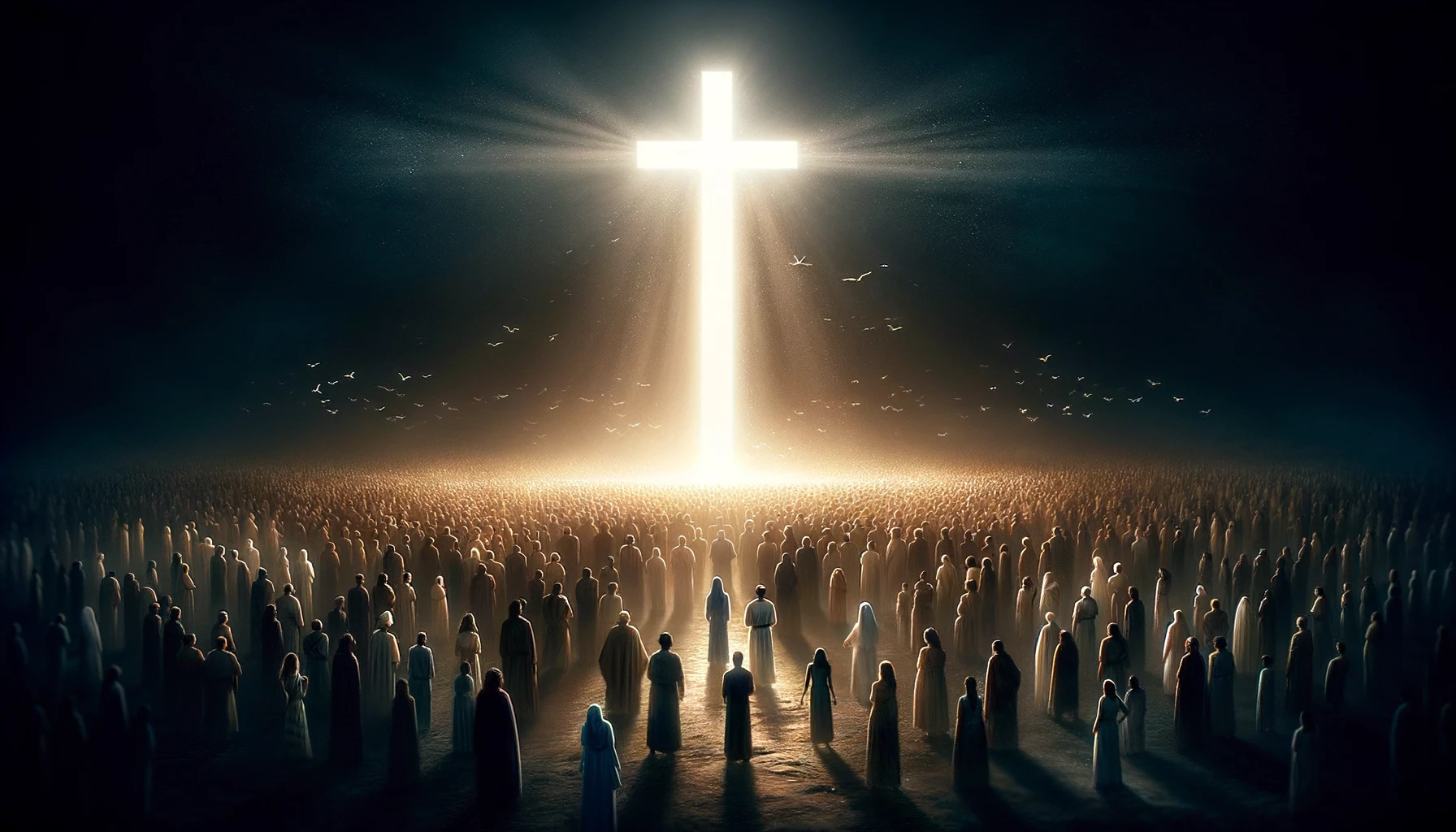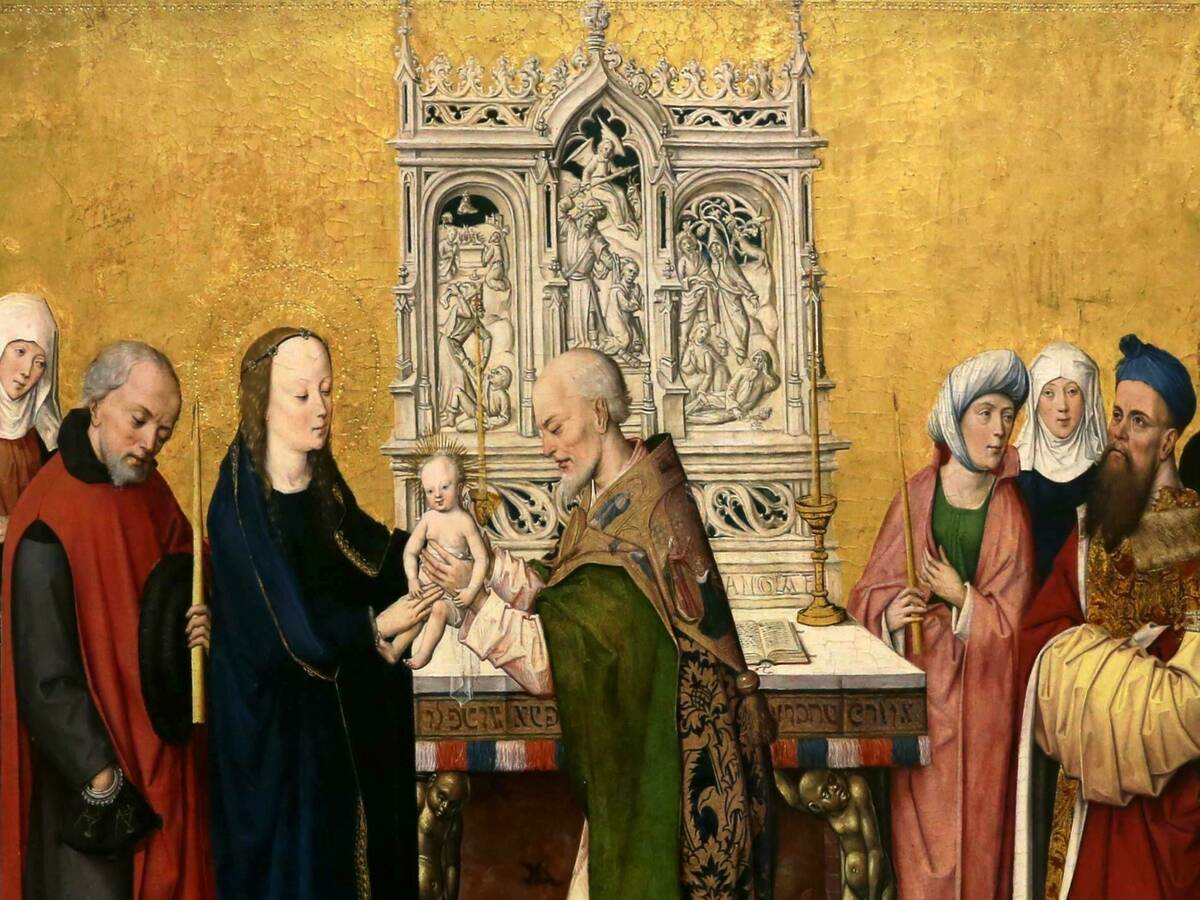Home>Theology and Spirituality>What Are The Theories Of Atonement


Theology and Spirituality
What Are The Theories Of Atonement
Published: February 9, 2024
Ericka Andersen, an editor at Christian.net, expertly merges digital strategy with content creation, focusing on faith and societal issues. Her communication skills enhance the platform's engaging narratives, fostering meaningful dialogue on belief's impact on society.
Explore the various theories of atonement in theology and spirituality. Gain insight into the different perspectives on the concept of atonement.
(Many of the links in this article redirect to a specific reviewed product. Your purchase of these products through affiliate links helps to generate commission for Christian.net, at no extra cost. Learn more)
Table of Contents
Introduction
The concept of atonement holds profound significance in Christian theology, serving as a cornerstone of belief and understanding. Atonement refers to the reconciliation of humanity with God through the sacrificial actions of Jesus Christ. This pivotal doctrine explores the nature of sin, the character of God, and the means by which humanity can be restored to a harmonious relationship with the divine.
The theories of atonement offer diverse perspectives on the nature and purpose of Christ's redemptive work. Each theory provides a unique framework for comprehending the significance of Jesus' life, death, and resurrection, shedding light on the multifaceted dimensions of atonement.
As we delve into the various theories of atonement, it is essential to approach them with an open mind and a willingness to explore the richness and complexity of theological thought. By examining these theories, we gain insight into the diverse ways in which theologians, scholars, and believers have grappled with the profound mystery of atonement throughout history.
Through this exploration, we can deepen our understanding of the profound love and grace inherent in the Christian faith, as well as the transformative power of Christ's redemptive work. The theories of atonement invite us to contemplate the profound implications of Jesus' sacrifice and the profound implications it holds for our lives and our relationship with God.
As we embark on this journey through the theories of atonement, let us approach this exploration with humility, reverence, and a sense of wonder at the depth of God's love and the profound mystery of redemption.
Read more: What Is Atonement
Recapitulation Theory
The Recapitulation Theory, attributed to Irenaeus of Lyons, offers a distinctive perspective on atonement that emphasizes the significance of Christ's life in redeeming humanity. This theory draws from the Apostle Paul's writings, particularly the concept of Christ as the "new Adam" who reverses the disobedience and sin of the first human. According to this theory, Jesus, through his incarnation, life, death, and resurrection, recapitulates or reenacts the entirety of human existence, thereby redeeming and restoring humanity to its original state.
Central to the Recapitulation Theory is the idea that Jesus, as the perfect and sinless Son of God, lived a life that encompassed the entirety of human experience, from birth to death. By undergoing the full spectrum of human existence, Jesus sanctified each stage of life, thereby redeeming and transforming it. His birth sanctified human birth, his life sanctified human life, and his death sanctified human death. In this way, Jesus' life becomes a model for humanity, offering a path to restoration and wholeness.
Moreover, the Recapitulation Theory emphasizes the notion of Christ as the head of a new humanity, representing all of humanity in his life and actions. Through his perfect obedience and faithful life, Jesus rectifies the disobedience of Adam, thereby restoring humanity's relationship with God. This theory underscores the transformative power of Christ's life, portraying it as the means through which humanity is reconciled to God and offered the possibility of spiritual renewal and growth.
In essence, the Recapitulation Theory presents Jesus as the embodiment of humanity's potential for redemption and restoration. By living a perfect and sinless life, Jesus reconstitutes and elevates human nature, offering a pathway for individuals to be reconciled with God and experience spiritual renewal. This theory invites believers to contemplate the profound significance of Christ's life and its transformative impact on the human condition, inspiring a deep sense of gratitude and reverence for the redemptive work of Jesus.
The Recapitulation Theory, with its emphasis on the comprehensive nature of Christ's life and its redemptive significance, offers a compelling perspective on atonement, inviting believers to reflect on the profound implications of Christ's role as the new Adam and the transformative power of his life for humanity.
Satisfaction Theory
The Satisfaction Theory, attributed to Anselm of Canterbury, presents a unique perspective on atonement, emphasizing the concept of divine justice and the satisfaction of God's honor. At the heart of this theory lies the notion that humanity, through its disobedience and sin, has incurred an infinite debt to God's honor and justice. According to Anselm, this debt cannot be overlooked or dismissed, as it represents a fundamental breach in the divine order.
In response to this theological dilemma, Anselm proposes that only a being of infinite worth and perfection can offer the necessary satisfaction to reconcile humanity with God. Thus, Jesus, as the incarnate Son of God, possesses the requisite divine and human nature to fulfill this role. Through his voluntary sacrifice on the cross, Jesus offers a satisfaction of infinite value, thereby addressing the debt of humanity's sin and restoring the honor of God.
Central to the Satisfaction Theory is the concept of the "satisfaction" rendered by Jesus through his obedient life and sacrificial death. By willingly submitting to the crucifixion, Jesus demonstrates the ultimate act of obedience and love, offering a perfect satisfaction for the offenses of humanity. This act of satisfaction serves to uphold the divine justice and honor, thereby reconciling humanity with God and restoring the disrupted relationship.
Moreover, the Satisfaction Theory underscores the voluntary nature of Jesus' sacrifice, highlighting the profound love and selflessness inherent in his redemptive work. Through his willingness to undergo suffering and death, Jesus exemplifies the depth of his commitment to restoring humanity to a state of grace and reconciliation with God.
In essence, the Satisfaction Theory invites believers to contemplate the profound implications of Jesus' sacrificial offering as the means of satisfying the demands of divine justice and reconciling humanity with God. This theory underscores the transformative power of Christ's redemptive work, portraying it as the ultimate expression of divine love and the restoration of the disrupted relationship between humanity and God.
The Satisfaction Theory, with its emphasis on the satisfaction of divine justice and honor through the sacrificial offering of Jesus, offers a compelling perspective on atonement, inviting believers to reflect on the profound implications of Christ's redemptive work and the transformative power of his sacrificial love.
Moral Influence Theory
The Moral Influence Theory of atonement presents a compelling perspective on the redemptive work of Jesus Christ, emphasizing the transformative power of his life and teachings. This theory, associated with theologians such as Peter Abelard and Friedrich Schleiermacher, focuses on the profound impact of Jesus' moral example and teachings on humanity's spiritual and ethical development.
At the core of the Moral Influence Theory is the belief that Jesus' life, ministry, and sacrificial death serve as a profound demonstration of God's love and compassion for humanity. Rather than emphasizing a transactional view of atonement, this theory highlights the moral and spiritual influence of Jesus' life as the primary means of reconciling humanity with God. According to this perspective, Jesus' exemplary life and teachings are intended to inspire individuals to embrace a life of love, compassion, and ethical integrity.
Furthermore, the Moral Influence Theory underscores the notion that Jesus' life and teachings have the power to transform human hearts and minds, leading individuals to a deeper awareness of God's love and the ethical principles inherent in the Christian faith. By embodying selfless love, compassion, and moral integrity, Jesus serves as a moral exemplar, inviting individuals to emulate his virtues and embrace a life characterized by love for God and neighbor.
Moreover, this theory emphasizes the profound impact of Jesus' sacrificial death as a demonstration of unconditional love and solidarity with humanity. His willingness to endure suffering and death serves as a powerful symbol of God's redemptive love, inspiring individuals to seek spiritual renewal and ethical transformation.
In essence, the Moral Influence Theory invites believers to contemplate the profound implications of Jesus' moral example and teachings as the means of inspiring spiritual and ethical growth. This theory underscores the transformative power of Christ's life and sacrificial love, portraying it as a compelling demonstration of God's unconditional love for humanity and the potential for moral and spiritual renewal.
The Moral Influence Theory, with its emphasis on the moral and spiritual impact of Jesus' life and teachings, offers a compelling perspective on atonement, inviting believers to reflect on the profound implications of Christ's redemptive work and the transformative power of his moral influence.
Penal Substitution Theory
The Penal Substitution Theory of atonement occupies a central position within Christian theology, offering a distinctive perspective on the redemptive work of Jesus Christ. At its core, this theory emphasizes the concept of substitutionary sacrifice, portraying Jesus as the innocent substitute who bears the penalty of humanity's sin on the cross.
Central to the Penal Substitution Theory is the notion that humanity, due to its sinful nature, stands condemned before a just and holy God. The theory posits that the divine justice demands retribution for sin, and the penalty for this transgression is death and separation from God. In response to this theological predicament, Jesus willingly offers himself as the sacrificial substitute, bearing the full weight of humanity's sin and enduring the divine wrath on behalf of humanity.
The sacrificial death of Jesus on the cross is viewed as the means by which the demands of divine justice are satisfied. By taking upon himself the punishment that humanity deserves, Jesus provides a pathway for reconciliation and redemption. His sacrificial offering serves to appease the righteous anger of God and atone for the sins of humanity, thereby restoring the broken relationship between humanity and God.
Moreover, the Penal Substitution Theory underscores the voluntary nature of Jesus' sacrifice, highlighting the profound love and selflessness inherent in his redemptive work. Through his willingness to endure the full extent of divine judgment, Jesus exemplifies the depth of his commitment to securing the salvation of humanity and reconciling them with God.
In essence, the Penal Substitution Theory invites believers to contemplate the profound implications of Jesus' substitutionary sacrifice as the means of satisfying the demands of divine justice and reconciling humanity with God. This theory underscores the transformative power of Christ's redemptive work, portraying it as the ultimate expression of divine love and the restoration of the disrupted relationship between humanity and God.
The Penal Substitution Theory, with its emphasis on the substitutionary sacrifice of Jesus as the means of atonement, offers a compelling perspective on the redemptive work of Christ, inviting believers to reflect on the profound implications of his sacrificial love and the transformative power of his atoning death.
Read more: What Is A Day Of Atonement
Governmental Theory
The Governmental Theory of atonement, advocated by theologians such as Hugo Grotius, presents a thought-provoking perspective on the redemptive work of Jesus Christ. This theory revolves around the concept of divine governance and the demonstration of God's justice, mercy, and moral order through the atoning sacrifice of Jesus.
At the heart of the Governmental Theory is the idea that God, as the supreme moral governor of the universe, upholds justice and maintains moral order within the divine framework. According to this perspective, the atoning death of Jesus serves as a demonstration of God's commitment to justice and the moral governance of creation. By voluntarily offering himself as a sacrifice, Jesus exemplifies the gravity of sin and the necessity of divine justice, thereby upholding the moral order established by God.
Furthermore, the Governmental Theory emphasizes the concept of divine satisfaction, not in the sense of retribution for specific sins, but rather as a demonstration of the seriousness of sin and the moral principles inherent in God's governance. Through the sacrificial death of Jesus, God manifests His abhorrence of sin while simultaneously extending mercy and grace to humanity. This act of divine satisfaction serves to uphold the moral order and demonstrate the consequences of sin, while also providing a pathway for reconciliation and redemption.
Moreover, the Governmental Theory underscores the transformative impact of Jesus' atoning sacrifice on the human conscience and moral awareness. By witnessing the selfless sacrifice of Jesus, individuals are invited to contemplate the gravity of sin and the depth of God's love and justice. This contemplation serves to inspire repentance, moral renewal, and a deeper appreciation for the moral governance of God.
In essence, the Governmental Theory invites believers to reflect on the profound implications of Jesus' atoning sacrifice as a demonstration of divine justice, mercy, and moral governance. This theory underscores the transformative power of Christ's redemptive work, portraying it as a profound expression of God's commitment to upholding moral order while extending grace and reconciliation to humanity.
The Governmental Theory, with its emphasis on divine governance and the moral demonstration of God's justice and mercy, offers a compelling perspective on atonement, inviting believers to contemplate the profound implications of Christ's sacrificial love and the transformative power of his atoning death.
Read more: What Is Atonement
Recapitulation Theory
The Recapitulation Theory, attributed to Irenaeus of Lyons, offers a distinctive perspective on atonement that emphasizes the significance of Christ's life in redeeming humanity. This theory draws from the Apostle Paul's writings, particularly the concept of Christ as the "new Adam" who reverses the disobedience and sin of the first human. According to this theory, Jesus, through his incarnation, life, death, and resurrection, recapitulates or reenacts the entirety of human existence, thereby redeeming and restoring humanity to its original state.
Central to the Recapitulation Theory is the idea that Jesus, as the perfect and sinless Son of God, lived a life that encompassed the entirety of human experience, from birth to death. By undergoing the full spectrum of human existence, Jesus sanctified each stage of life, thereby redeeming and transforming it. His birth sanctified human birth, his life sanctified human life, and his death sanctified human death. In this way, Jesus' life becomes a model for humanity, offering a path to restoration and wholeness.
Moreover, the Recapitulation Theory emphasizes the notion of Christ as the head of a new humanity, representing all of humanity in his life and actions. Through his perfect obedience and faithful life, Jesus rectifies the disobedience of Adam, thereby restoring humanity's relationship with God. This theory underscores the transformative power of Christ's life, portraying it as the means through which humanity is reconciled to God and offered the possibility of spiritual renewal and growth.
In essence, the Recapitulation Theory presents Jesus as the embodiment of humanity's potential for redemption and restoration. By living a perfect and sinless life, Jesus reconstitutes and elevates human nature, offering a pathway for individuals to be reconciled with God and experience spiritual renewal. This theory invites believers to contemplate the profound significance of Christ's life and its transformative impact on the human condition, inspiring a deep sense of gratitude and reverence for the redemptive work of Jesus.
The Recapitulation Theory, with its emphasis on the comprehensive nature of Christ's life and its redemptive significance, offers a compelling perspective on atonement, inviting believers to reflect on the profound implications of Christ's role as the new Adam and the transformative power of his life for humanity.
Christus Victor Theory
The Christus Victor Theory presents a profound and compelling perspective on the atonement, emphasizing the triumphant victory of Jesus Christ over the powers of sin, death, and evil. Rooted in the early Christian tradition and attributed to theologians such as Gustaf Aulén, this theory portrays Jesus as the victorious conqueror who liberates humanity from the bondage of sin and restores the cosmic order.
At the heart of the Christus Victor Theory is the recognition of the spiritual warfare and cosmic conflict inherent in the human condition. According to this perspective, humanity is ensnared by the forces of sin, spiritual darkness, and alienation from God, resulting in a state of bondage and despair. In response to this predicament, Jesus enters into the world as the divine warrior, embarking on a mission to confront and overthrow the oppressive powers that hold humanity captive.
The theory underscores the profound significance of Jesus' life, death, and resurrection as a cosmic battle and ultimate triumph over the forces of evil. Through his sacrificial death on the cross, Jesus confronts the powers of darkness and sin, dismantling their hold on humanity and offering liberation and redemption. His resurrection serves as the definitive victory over death, signaling the restoration of life and the defeat of all forces that seek to separate humanity from God.
Moreover, the Christus Victor Theory emphasizes the role of Jesus as the divine liberator who reconciles humanity with God and restores the cosmic order. By triumphing over sin and death, Jesus offers a pathway for individuals to experience spiritual renewal, freedom from bondage, and reconciliation with the divine. This theory invites believers to contemplate the profound implications of Christ's victory as the means of overcoming the spiritual forces that seek to hinder humanity's relationship with God.
In essence, the Christus Victor Theory presents Jesus as the triumphant conqueror who inaugurates a new era of freedom, restoration, and reconciliation. His victory over sin, death, and evil offers hope and transformation, inviting individuals to embrace the profound implications of Christ's redemptive work and the transformative power of his triumphant victory.
The Christus Victor Theory, with its emphasis on the victorious triumph of Jesus over the powers of darkness, offers a compelling perspective on atonement, inviting believers to reflect on the profound implications of Christ's redemptive work and the transformative power of his triumphant victory.














